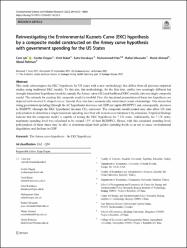Reinvestigating the Environmental Kuznets Curve (EKC) hypothesis by a composite model constructed on the Armey curve hypothesis with government spending for the US States

Göster/
Erişim
info:eu-repo/semantics/openAccessTarih
2022Yazar
Işık, CemOngan, Serdar
Bulut, Ümit
Karakaya, Sahir
Irfan, Muhammad
Alvarado, Rafael
Ahmad, Munir
Rehman, Abdul
Üst veri
Tüm öğe kaydını gösterKünye
Işık, C., Ongan, S., Bulut, U., Karakaya, S., Irfan, M., Alvarado, R., ... & Rehman, A. (2021). Reinvestigating the Environmental Kuznets Curve (EKC) hypothesis by a composite model constructed on the Armey curve hypothesis with government spending for the US States. Environmental Science and Pollution Research, 1-12.Özet
This study reinvestigates the EKC hypothesis for US states with a new methodology that differs from all previous empirical studies using traditional EKC models. To this aim, this methodology, for the first time, unifies two seemingly different but strongly interrelated hypotheses (models), namely the Armey curve (AC) and traditional EKC models, into one single composite model. The rationale for creating this composite model is twofold. First, the functional propositions of these two hypotheses are depicted with inverted U-shaped curves. Second, they also have economically interrelated-causal relationships. This means that rising government spending (through the AC hypothesis) increases real GDP per capita (RGDPPC) and, consequently, increases in RGDPPC (through the EKC hypothesis) increase CO2 emissions. The composite model created may also allow US state policymakers to determine a single maximum spending level that will maximize or minimize CO2 emissions. Empirical findings indicate that the composite model is capable of testing the EKC hypothesis for 7 US states. Additionally, for 7 US states, maximum spending level was calculated to be around 15% of their RGDPPCs. Hence, with this calculated spending level, policymakers of these states may be able to determine-adjust their golden spending levels so as not to cause environmental degradation and declines in GDP. © 2021, The Author(s), under exclusive licence to Springer-Verlag GmbH Germany, part of Springer Nature.

















